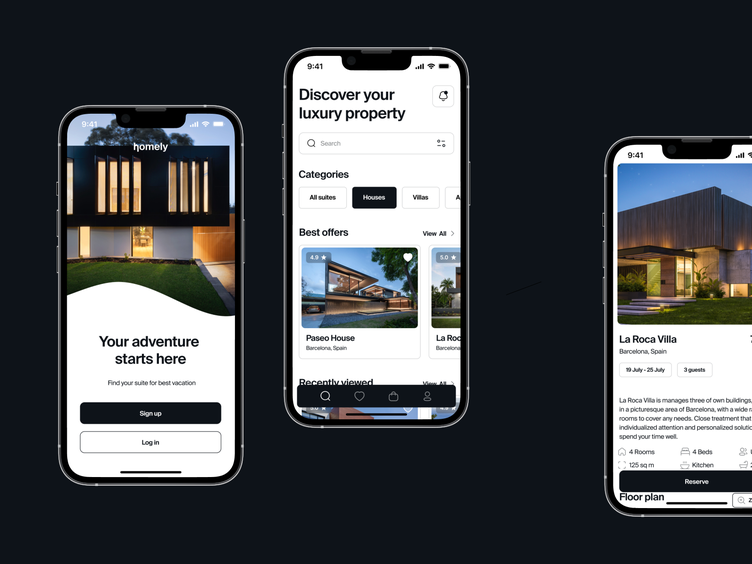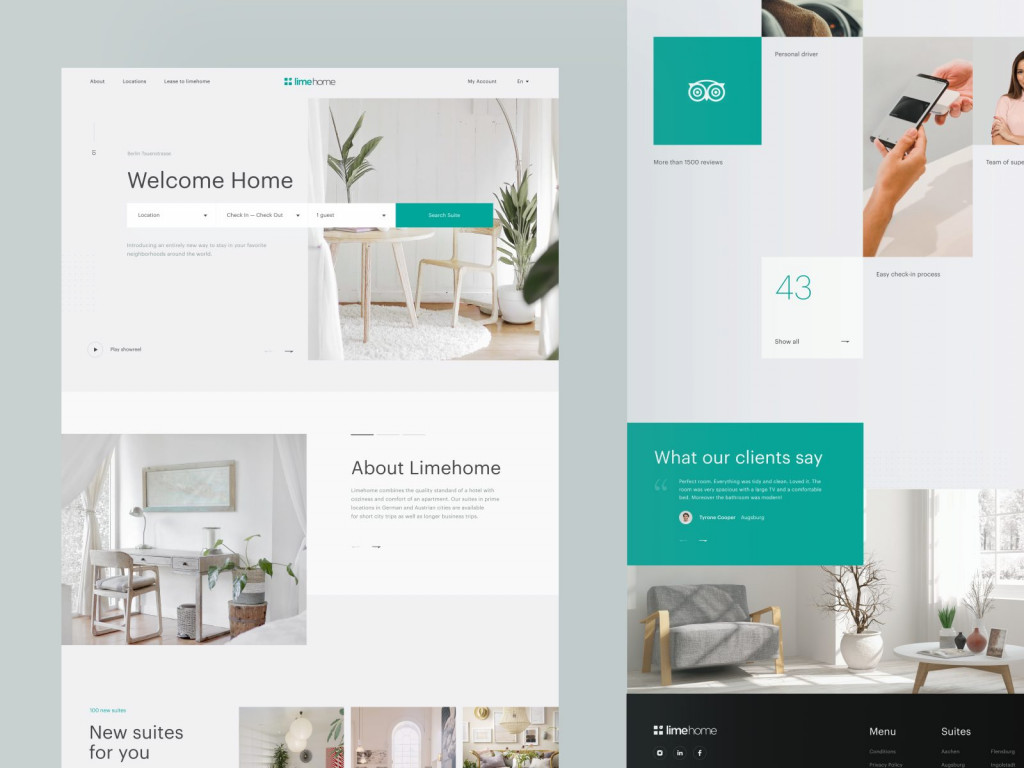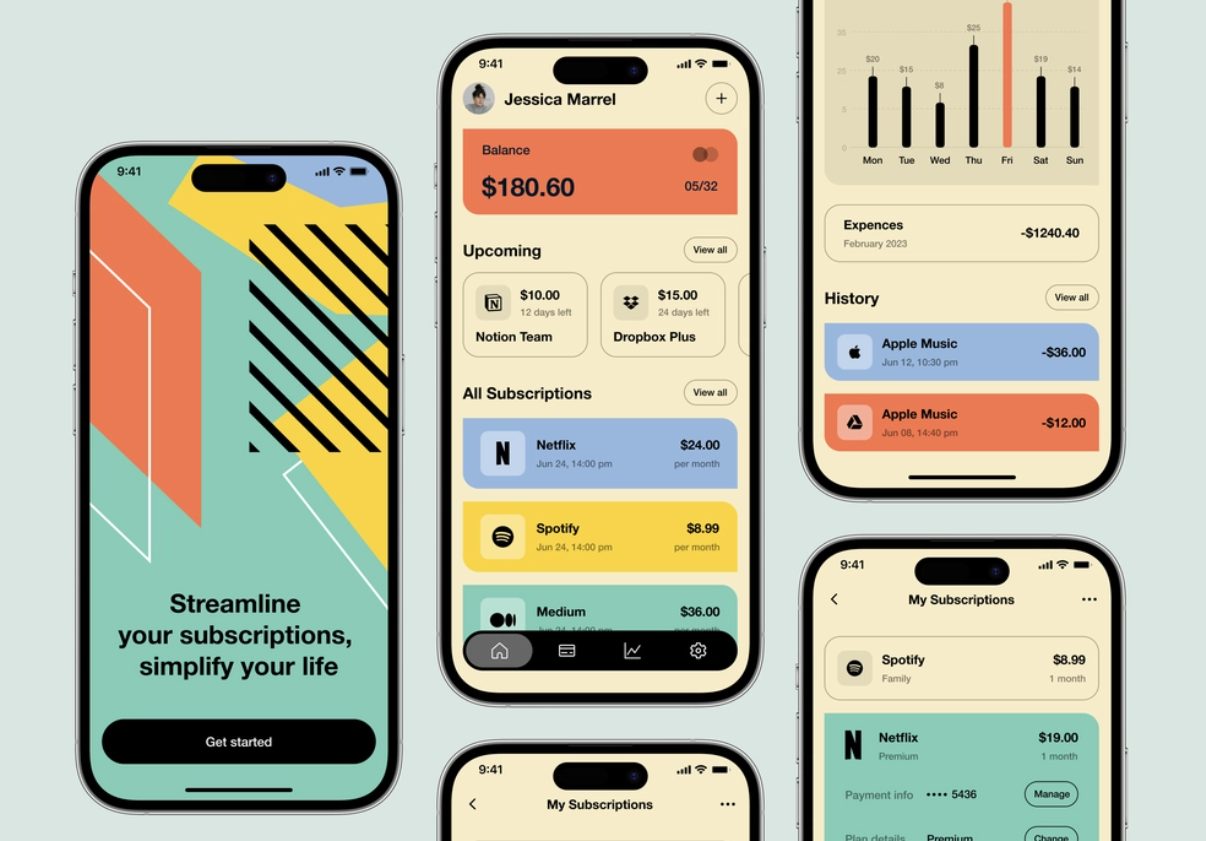If you’re working in the hospitality industry, you know no one will call you to book a room anymore. To attract guests, you need to build a hotel website and give people an easy way to make a reservation. Otherwise, they’ll keep looking. But where do you even begin? In this post, we’ll break down everything you need to know to create a hotel website or a booking aggregator that drives sales and leaves your guests with a nice feeling of “wow, that was easy.” Now, let’s start!

Online Hotel Booking: The Market Overview
The hotel booking market has undergone a massive transformation in recent years. With the rise of online booking platforms like Booking.com, Agoda, and Airbnb, travelers have more options than ever when it comes to finding and booking hotel rooms and apartments. It has created a highly competitive marketplace, with hotels of all sizes vying for the attention of potential guests.
Revenue in the hotel segment is projected to reach US$408.8 billion in 2023, and 81% of that revenue will come from online sales. To succeed in this landscape, hotels don’t just need a website; they need a perfectly built website that offers a seamless booking experience.
Here are some more numbers to convince you that a hotel has no chance to succeed without investing time and budget into a booking website:
- Around 80% of guests prefer to book hotels and apartments with a desktop or a laptop, but 70% use their smartphones to do hotel research.
- 148 million online bookings are made annually.
- The online booking market makes up 63% of the whole travel industry value.
More and more travelers prefer automated online bookings, with no or very few human interactions. The only way to give them that is to create a hotel website that allows swift and easy reservations and represents your hotel brand in the best way possible. As a travel website development company, we specialize in creating exceptional hotel booking websites tailored to your business needs.
Types of Online Hotel Booking Software
Once you start researching hotel website development, you’ll see there are several software solutions required to build a powerful, effective, and user-friendly website. Depending on your requirements, you’ll either need to integrate all or some of them into your website.
Property management system (PMS)
A property management system (PMS) is a crucial component of hotel technology that streamlines administrative tasks, such as reservations, guest profiles, billing, and room statuses. Almost all hotel departments rely on the PMS, from front desk agents to finances and housekeeping. A simple PMS doesn’t allow booking from the guest’s side, so it needs to be integrated with a booking engine and a channel management solution. More advanced options already provide additional models for full automation of the hotel management process.
The most popular PMSs are:
Central Reservation System (CRS)
A central reservation system (CRS) is a software platform that allows hotels to manage their room inventory and availability across multiple distribution channels, including online travel agencies (OTAs), metasearch engines, and the hotel’s own website. The CRS software provides a centralized platform to manage all reservations, ensuring that room availability is up-to-date across all channels. This helps to reduce the risk of overbooking, which can lead to unhappy guests and lost revenue. The CRS software also provides real-time access to reservation data, which helps hotels optimize their pricing and revenue strategy. A Central Reservation System works in conjunction with other hotel technologies, including revenue management systems, property management systems, and channel managers.
The most popular CRSs are:
Booking Engine
A booking engine is a software allowing guests to book hotel rooms directly from the hotel’s website, so it’s exactly what you need to stream up the room reservation process. It integrates with the hotel’s PMS and CRS systems to ensure up-to date room availability and pricing. The booking engine allows hotels to customize their booking process, display room rates, room types, and any additional fees or charges. Some property management systems and hotel website builders include integrated booking engines, but don’t skip on research to find the most user-friendly option.
The most popular booking engines are:
Channel Manager
A channel manager is a tool that allows hotels to efficiently manage their presence on multiple third-party booking channels, from large OTAs (like Booking.com) to smaller niche sites and wholesalers. Manually updating rates and availability on these channels can be daunting for hotels, which is where a channel manager comes in. It integrates with the hotel’s PMS and CRS systems to automatically update room availability and pricing across all channels in real time, helping to reduce the risk of overbooking. Some property management systems include integrated channel management functionality, while others require a separate channel manager to be used in conjunction.
The most popular channel managers are:
Hotel Booking Website: Essential Features and Functionality
We’ve looked under the curtains of a hotel booking website, now let’s think of the users. Which features should they get on your website? Which of them are essential, and which can be skipped for the sake of time- and budget efficiency? Let’s look at the basic functionality set you’ll need to create a hotel website that can stand the competition.
Search and filter options
Your potential guests should be able to filter rooms by price range and available dates, to say the least. The advanced search might include room size, amenities, and guest reviews. If you are building a large booking platform that includes multiple hotels, all of these same filters can be applied to hotel options as well, allowing users to easily compare and select the best options for their needs.
Booking and payment system
Obviously, your guests should be able to book a room as fast and easily as possible. The payment system should support different banking methods, such as credit cards, PayPal, and bank transfers, and should be secure and reliable to protect users’ sensitive information. It would be nice if you could also offer a “book now — pay later” option as lots of users prefer paying directly at the hotel.
Localization and currency change
If you aim at an international audience, make sure your website is well-translated and localized, and the payment system supports automatic currency exchange. It’s probably not a must-have feature, and English is often enough, but it’s a nice touch that can attract more guests.
Reviews and ratings
If you ask frequent travelers which factors they consider when choosing a hotel for a vacation, they’ll most likely name three things: price, location, and guest reviews. Whether you are building a single hotel booking website or a booking aggregator, include honest reviews — they’ll help you build trust.
User profile and dashboard
We put this feature at the end of the list, but its importance depends on the website type you are building. If it’s a booking website for one hotel, you might sometimes skip this feature and allow your users to book a room without creating a profile. If it’s a large hotel booking marketplace, your users will probably want a profile where they can see their booking history, save personal data, keep a list of places they’d like to visit, and get personalized recommendations.
User registration and login
If you decide to include a user profile feature in your hotel booking website, make sure to keep the registration process simple. Allow your users to save their credentials for future logins, and be very secure about their personal information. It can be a crucial factor in building your reputation — or destroying it by one small data leak.
Mobile optimization
As we already mentioned, most people look for a hotel from a smartphone, but then book it with a desktop. Most likely, the reason is that mobile versions of most hotel booking websites and aggregators look rather heavy, complicated, and just scary. Forms are difficult to complete, and mobile payment options are not integrated, so it’s just easier to open a desktop version to finalize a booking. You can change it by building a mobile-friendly website that lets your guests book a room and pay for it on the go.
How to Create a Hotel Booking Website: 8 Key Steps
Building a website is a complex process that requires a team of experts, in the best-case scenario. While automated website builders might look nice and easy to use, they can’t provide the level of functionality needed for a full-scale booking project, not just a single-page promo website.
The road to your awesome hotel booking platform will most likely consist of the following steps.
Choose a development team
The expertise of people working on your website is one of the key factors for future success. Make sure the team has experience in this kind of job, positive reviews from previous clients, and transparent cooperation conditions.
Plan and research
Once the team is assembled, it’s important to make your requirements and expectations as clear as possible. Create a plan outlining the features, functionalities, and pages you want to see on your website. Conduct market research, check what your competitors are doing, and which gaps you can fill with your hotel booking website.
Design the website
Once you have a team and a plan, the next step is to create the website UI and UX design. And it is not just about making it visually appealing and trendy; it’s also about creating a user-friendly experience that encourages visitors to book a room. The website design should be intuitive, with a clear structure that makes it easy for users to find the information they need and complete the booking process. Designers should keep in mind your hotel’s target audience and your brand’s image.
Develop the website
The development team will start building the website backend and frontend based on your requirements and the functionality you planned at the first stages of the project. They will set up the server, develop the booking engine, integrate payment gateways, and connect the website to the channel manager. They must choose the right technology stack to ensure the quality and scalability of the website.
Test the website
Once development is complete, it’s time to test the website thoroughly and make sure it works correctly and meets all requirements. At this point, a testing team should simulate different user scenarios and implement various testing practices to catch out any bugs, glitches, and imperfections.
Integrate with third-party tools
To maximize your hotel’s efficiency and online exposure, it’s important to integrate your website with third-party tools such as channel managers, review platforms, and social media channels. It will help you reach a wider audience and increase bookings.
Optimize for SEO
Search engine optimization (SEO) is necessary to help your website rank well on search engines. Work with your development team to optimize your website’s content, metadata, and other factors that affect your search engine ranking.
Launch the website
Once everything is in place and the website has been thoroughly optimized and tested, it’s time to launch. Make sure to promote the launch to your target audience and encourage them to book directly on your website. Continuously monitor and improve the website’s performance — the job is never done if you want to succeed.
Benefits of Custom Booking Website Development
When creating a hotel booking website, you have two choices: either use a website builder or hire a team of professional developers and designers. Of course, website builders have their advantages, and the main one is that they are cheap, sometimes even free. But it is often the case where you get what you pay for. And while working with experts is more expensive, it has a number of advantages that compensate for the higher price.
Custom design and functionality
A custom website allows you to design and build a unique platform tailored to your business needs, with any feature you can imagine. You can create a website that matches your technical requirements, budget, and brand identity and offers specific functionalities that unavailable on generic website builders.
Scalability and flexibility
Custom websites are more scalable and flexible than generic website builders. You can add new features and functionalities as your business grows without worrying about compatibility issues. Doing the same with a website generated for free will most likely result in decreased performance and glitches.
Improved user experience
Professional website development teams have extensive experience in designing and developing websites that provide an exceptional user experience. They can not only create a beautiful interface with the colors that you chose but, more importantly, optimize your website’s usability, performance, and responsiveness, and it’s the shortest way to happy guests and higher conversion rates.
Better security and performance
Custom websites are more secure and perform better than the ones created with generic website builders. A professional team can implement robust security measures and protect the users’ data from leaks and cyber attacks.
Support and maintenance
When you hire a professional team for custom website development, you get ongoing support and maintenance services. You can rest assured that your website will be up-to-date, secure, and functioning correctly at all times. With a generic builder, you are mano a mano with your website, and whatever bugs or performance issues happen — you’ll be the one to take care of them.
The Costs of Hotel Booking Website Development
When choosing between different development options, it’s not only about “how to create a hotel booking website,” it’s also about “how much it will cost me.” The price for custom website development might vary significantly depending on the following factors:
- Number and complexity of features
- Design requirements
- Third-party integrations
- Customization and branding needs
- Hosting and domain registration fees
- Ongoing maintenance and support services
- Team location and experience
- Time frames
Each of these factors can impact the cost of website development. More complex features and customizations will increase the time and effort required to complete a project, so the cost will rise. On the other hand, opting for pre-built templates and standard features can help reduce costs. Generally, a professional team can develop a custom hotel booking website for a price range of $10,000 to $50,000, but the final cost can only be estimated after a detailed project breakdown.
How We Can Build A Hotel Booking Website For You
Fireart team has extensive experience in building hotel booking websites of all kinds. Whether you need an app to showcase luxury property….

… or a beautiful and user-friendly platform to help people find the best hotels in Europe….

…. we can build one for you. With Fireart Studio, you will get:
- Custom design and functionality. We create custom designs that are beautiful, user-friendly, and match your brand identity.
- User experience and conversion optimization. We know how to optimize user experience with intuitive user flows, clear calls to action, and engaging visual elements.
- Scalability. We build scalable and flexible websites, allowing you to add new features and functionalities as your business grows.
- Mobile optimization. Our websites are always optimized for mobile use, so that your website is accessible and functional for all users, no matter what device they use.
- Ongoing support and maintenance. We provide ongoing support and maintenance services to ensure that your website is up-to-date, secure, and functioning correctly at all times.
- Competitive pricing. We offer competitive pricing so that you can get high-quality website development services without breaking the bank.
- Quick results. Our experienced team works efficiently to deliver your project on time and within budget, providing you with quick results without sacrificing quality.
- Transparent communication. We believe in transparent communication throughout the development process, keeping you informed of progress, challenges, and opportunities for improvement.
Final Words
When it comes to building a hotel booking website, there are lots of options to choose from. You can make a simple site or a sophisticated booking marketplace, hire a professional team or use a free website builder. However, it’s important to remember that the quality of your website will directly impact your business success. A poorly designed or slow-loading website can drive customers away, while a well-crafted and user-friendly website can lead to increased conversions and customer loyalty. While using a free website builder may seem like a cost-effective option, it’s important to consider the limitations and lack of customization that come with it. Hiring a professional team with experience in hotel booking website development can provide you with a customized solution that meets your business needs and drives results. Ultimately, the choice is yours, but investing in a high-quality hotel booking website is an investment in the future success of your business.





















